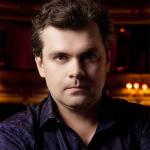
The internationally renowned Russian bass speaks about his recital which will take place on 15 July at the Concert Hall of the Mariinsky Theatre
– You appear to equal acclaim in operas and in concert programmes – but which do you personally prefer? How do these two sides of performing affect each other?
– They are very closely linked indeed! A chamber programme involves filigree work in which it is very important not to lose sight of the piece as a whole by becoming enmeshed in the details. It’s the same with opera music: if you focus too much on presenting an image then you lose the dynamism and the development and the shading becomes blurred. For me chamber music and opera music complement one another.
– The programme of your concert includes romances by Tchaikovsky and Musorgsky, whose principles were vastly different in many ways. Why did you decide to combine their works in one programme?
– I wanted to convey Tchaikovsky’s chamber music lyricism and Musorgsky’s theatrical psychology. This also presents a certain challenge for me as a performer: both of these composers requires a different approach to vocals and switching from one to the other, changing from chamber music to more theatrical music is not so easy.
– You’re going to be performing romances by Tchaikovsky which you recorded on disc in 2004. How does your interpretation of the repertoire change as time passes?
– I found it incredibly interesting and pleasant to return once again to the romances of Tchaikovsky which I had recorded as part of a special prize after winning the XII International Tchaikovsky Competition. You see, over the course of thirteen years I have changed inside, and my vocal gift and technique have also changed. Since making that recording I have not performed so many of these romances together, and working on them again – with new skills I have since acquired – was very engaging. I understood that then, perhaps, I didn’t do everything brilliantly, while now, having developed personally and vocally, they sound totally different! Moreover, in the year of the International Tchaikovsky Competition and the anniversary of the composer’s birth, I want to make my own small contribution to celebrate such a tremendous event in the music world of Russia.
– It is well known that Songs and Dances of Death is an incredibly complex cycle demanding huge skill. In order to convey the gallery of images of death in its various hypostases the singer requires not just outstanding vocal abilities but dramatic talent too. What’s the most interesting thing for you in this work?
– Performing Musorgsky’s Songs and Dances of Death is also a tremendous task. Apropos, it was Yuri Khatuevich Temirkanov, among other colleagues, who “infected” me with it; I first performed this cycle with him – many years ago – with an orchestra at the Great Hall of the Moscow Conservatoire and later at the Lucerne Festival. The orchestral version, thanks to its different timbres and colours, gives Songs and Dances of Death theatricality and a good operatic quality, and the experience of working on it with an orchestra deepens your understanding of the opus as a whole as well as helping you perform it to piano accompaniment.
It is music of dramatic psychological theatre. For me as a Russian bass singer all of Musorgsky’s music is the acme, the crowning glory of this theatre! You never tire of this music, although it does demand a very high degree of emotion, an understanding of the text and an informal approach to it. Boris Godunov and Songs and Dances of Death in particular are works that offer endless possibilities for the imagistic intonation of the lexis. Depending on how you perceive this text and your emotions and mood, every singer will perform it differently. And it’s impossible to stop the search for new facets to this music. It’s alive, and its brilliance is eternal, just as the theme of life and death is eternal for mankind...
Speaking with Nadezhda Kulygina